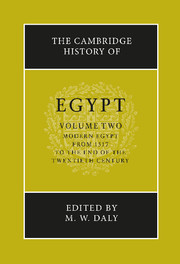Book contents
- Frontmatter
- 1 Ottoman Egypt, 1525–1609
- 2 Egypt in the seventeenth century
- 3 Egypt in the eighteenth century
- 4 Culture in Ottoman Egypt
- 5 The French occupation of Egypt, 1798–1801
- 6 The era of Muhammad ’Ali Pasha, 1805–1848
- 7 Egypt under the successors of Muhammad ’Ali
- 8 The Egyptian empire, 1805–1885
- 9 The ‘Urabi revolution and the British conquest, 1879–1882
- 10 The British occupation, 1882–1922
- 11 Social and economic change in the “long nineteenth century”
- 12 The liberal age, 1923–1952
- 13 Egypt: society and economy, 1923–1952
- 14 Republican Egypt interpreted: revolution and beyond
- 15 Modern Egyptian culture in the Arab world
- Select Bibliography
- Index
- References
7 - Egypt under the successors of Muhammad ’Ali
Published online by Cambridge University Press: 28 March 2008
- Frontmatter
- 1 Ottoman Egypt, 1525–1609
- 2 Egypt in the seventeenth century
- 3 Egypt in the eighteenth century
- 4 Culture in Ottoman Egypt
- 5 The French occupation of Egypt, 1798–1801
- 6 The era of Muhammad ’Ali Pasha, 1805–1848
- 7 Egypt under the successors of Muhammad ’Ali
- 8 The Egyptian empire, 1805–1885
- 9 The ‘Urabi revolution and the British conquest, 1879–1882
- 10 The British occupation, 1882–1922
- 11 Social and economic change in the “long nineteenth century”
- 12 The liberal age, 1923–1952
- 13 Egypt: society and economy, 1923–1952
- 14 Republican Egypt interpreted: revolution and beyond
- 15 Modern Egyptian culture in the Arab world
- Select Bibliography
- Index
- References
Summary
The political history of Egypt between 1848 and 1879 is dominated by the buildup of the dynastic state and by European economic and political penetration leading to the establishment of foreign control. These interacted with each other and provided the context for other important developments, such as the breakdown of viceregal autocracy. Power relations changed between the ruler and his elite, whose members were developing interests of their own, and between government and society. The central power became partially Egyptianized while subjecting the mass of society to greater regulation and control.
The growth of the state was marked by consolidation of the Muhammad ’Ali family as an Egyptian dynasty, expansion of the administrative apparatus, and the appearance of a bureaucratic elite with a new indigenous component. Foreign penetration was expressed in appropriation by Europeans of part of Egypt’s rural surplus, the self-assertion and intervention of foreign consulates, lending by European bankers, and the buildup of a huge debt owed entirely to foreigners. Beginning in 1875, these developments converged. An international control over Egyptian finances was established, creating a state within a state. The European powers and bondholders then destroyed the viceroy’s autocratic powers while retaining the office and the dynasty. By 1879, Europe had taken over the state itself – the prize and object of power.
- Type
- Chapter
- Information
- The Cambridge History of Egypt , pp. 180 - 197Publisher: Cambridge University PressPrint publication year: 1998
References
- 7
- Cited by

